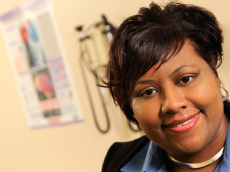A busy May
What do a glass elevator and airline jet have in common? Emory nurse practitioner Valencia Hawthorne was called into action in both this past May.
The elevator incident may sound like a horror story to anyone with a fear of heights, enclosed spaces, or teenagers. While Hawthorne was chaperoning a prom at a local Atlanta hotel, her elevator got stuck 14 floors up. She was inside with 12 teenagers and four other adults, and firefighters told the group they were unsure how many hours it would take for the rescue. It ended up being more than two. There was no ventilation or A/C until a firefighter opened a small hole to allow air to come in. And there was no way out. Teens were starting to panic. “Some of them could actually see their parents down below on the street,” says Hawthorne, who works in neurology in the Emory Clinic.
The other adults were anxious as well. “You could tell they were concerned,” Hawthorne says. “So I assumed my nurse’s role and tried to handle things.” She assessed the group for claustrophobia and anxiety, got the fire department to hand them water through a small hole, and began distracting everyone with jokes and a sing-a-long. Ultimately, everyone made it out by crawling out through the elevator shaft.
Barely recovered from that adventure, Hawthorne was called into action again a few weeks later—this time on a flight preparing for takeoff. A young passenger was sweating profusely and complaining of headache and chest pain. “We were thinking it could be a small headache or as bad as an aneurysm. Or, he could have been having a heart attack from the chest pain,” Hawthorne says.
 |
When another medical professional on board suggested aspirin, Hawthorne’s neurology experience kicked in: She warned against aspirin’s blood-thinning properties, in case there was bleeding in the man’s brain. She looked at his pupils, tried to get him to focus, and evaluated how alert he was.
An hour later, the plane departed, but without the ill man. An ambulance took him to the hospital. While Hawthorne appreciated the applause from fellow passengers and the move to a first-class seat, she insists her off-duty help—from elevators to airplanes—is no big deal. “It’s nothing special,” she says. “If there’s a crisis going on, I would love to be the one who can help and assist.”
In early June, she received an unexpected letter from the airline, offering their official thanks and some free travel. She’s thinking about taking another trip—crisis-free—next May. –Dana Goldman


